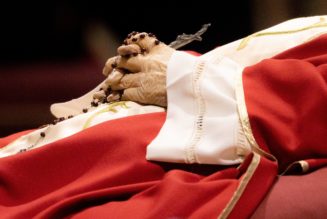The sisters were to be “poor servants of a poor people.” Pope Francis explained: “At the center of their lives was the Eucharist, ‘a sacrament of love, a sign of unity, a bond of charity,’ as the Second Vatican Council teaches us (Sacrosanctum Concilium, 47).”
“Love, unity, and charity. What does this mean? To adore, to serve, and to repair, that is, to fill with tenderness … to fill with tenderness the wounds and voids produced by sin in man and society, beginning by kneeling before Jesus in the Consecrated Host and remaining there for a long time,” he said.
Nocche recommended that the sisters remain in prayer before the Eucharist “even when we seem to feel nothing, in quiet and trusting abandonment, because ‘Magister adest,’ (‘the Master is here’) (Jn 11:28).”
“By the world’s standards this strategy of action seemed absurd: In the face of immense needs and with almost no resources available, what sense could there be in telling the sisters to get down on their knees for ‘adoration and reparation’? Yet, as always, the way of faith and self-offering worked in this case too,” Pope Francis said.
“The prayers of those courageous women indeed generated a contagious force, which soon led them to undertake and promote works of material, cultural, and spiritual redemption far exceeding all expectations.”







